SHERRILL'S
INN - VOLUME 1
Annotations by D.H. Ramsey |
Thumbnail |
| Vol. I - Page 1 |
F.W.
Pickens of Edgefield, S. C., served as Minister to Russia from 1857 to 1860, was a
member of the South Carolina legislature during the Nullification
Controversy, was the first governor of South Carolina after that state
seceded from the Union. He was a very successful planter of considerable
wealth.
Governor
W. B. Seabrook of Edisto
was a prominent South Carolina politician who served as governor of his
state 1848-50. |
 |
| Vol. I - Page 2 |
I.
Waddy Thomson, Fredonia, Union District.
This would have been Waddy Thomson who served in the United States
House of Representatives (1835-41) and as Minister to Mexico (1842-44).
As a youth he attended the Old Newton Academy in Asheville . If the
registrant was not the above mentioned Waddy Thompson, then it was
doubtless his father who bore the same name.
|
 |
| Vol. I - Page 3 |
|
 |
| Vol. I - Page 4 |
Miss
May Wheat, Chapel Hill, N. C. and Miss
Susan Battle, Chapel Hill, N. C. Miss
Wheat was the daughter of John T. Wheat, Professor of Logic, and Miss
Battle was the daughter of William H. Battle, Professor of Law, at the
University of North Carolina. Miss
Battle was the sister of Dr. Kemp P. Battle who later served as President
of the University of North Carolina.
She was a kinswoman, I suspect, of Dr. S. Westray Battle.
D.
H. Jacques, Charleston, S. C. He
was the author of many books, a poet of parts and editor of an
agricultural magazine, The Rural Carolinian.
He was a physician by profession.
Sometime in the 1850’s - exact date unknown - the Asheville News
published the poem, "Swannanoa," attributing the authorship to Jacques. In
his work, North Carolina Poetry, Walser says of
"Swannanoa," "No poem written in North Carolina before the
War Between the States has been more popular."
Many poets have claimed the authorship of the poem.
Sondley appears to believe that Jacques was the author.
Walser asserts that the authorship "still remains a
mystery." Calvin H.
Wiley in his 1851 edition of the "North Carolina Readers"
attributes the poem to an unnamed contributor to the Asheville News.
Mary Bayard Clarke in her Wood-Notes (1854) includes it
as one of her poems. A
Charlotte poet of about the same time - Shilo Henderson - also claimed
that he was the author. Ramsey
is inclined to the view that the weight or available evidence supports
Jacques. |
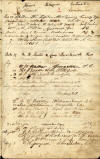 |
| Vol. I - Page 5 |
W.L.
Steele, Richmond, N.C. Walter Leak Steele was a prominent politician of Richmond County.
He served
as a member of the North Carolina House of Commons in 1846, 1848, 1850
and 1854 and was a member of the State Senate in 1852 and 1854.
He was a Democratic delegate to the 1860 Democratic conventions at
Charleston and Baltimore. He was secretary of the North Carolina convention in 1861
which passed the ordinance of secession.
He was a Democratic elector in 1876 and served in the 45th
and 46th Congress. He
declined reelection. |
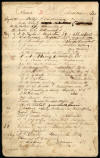 |
| Vol. I - Page 6 |
Miss
M. A. Morrison, Cottage Home, N.C. and Miss
Eugenia Morrison, Cottage Home, N.C. These
two young ladies were the daughters of Rev. R. H. Morrison, one of the
early Presidents of Davidson College.
Mary Anne Morrison married General Stonewall Jackson being his
second wife. She spent the last years of her widowhood in Charlotte and
was truly a "grand old lady."
Eugenia Morrison married General Rufus Barringer of Cabarrus County.
She was the mother of Dr. Paul B. Barringer, one of the early
Presidents of V.
P. I. and the last Chairman or the Faculty of the University of Virginia.
Dr. Paul B. Barringer was extremely popular with the Virginia students who
affectionately called him "Oom Paul" after the Boer leader
“Oom Paul” Krueger. Paul
B. Barringer, Jr., now a prominent New York attorney, married Miss Mary
Minor of Asheville, the daughter of Dr. and Mrs. Charles L. Minor of
Asheville.
A third daughter of Rev. R. H. Morrison married Alfonso C. Avery of
Burke County
who served for eight years as Associate Justice of the North Carolina
Supreme Court and who was the father of the late A. C. Avery who lived in
Ashevi1le during the last years of his life.
The Fourth of the Morrison young ladies married General D. H. Hill, C.S.A.,
a military leader of no small distinction.
From the above it will be noted that three of the Morrison daughters
married Confederate Generals. |
 |
| Vol. I - Page 7 |
W.L.
Hilliard, Asheville, N. C.
Dr.
W. L. Hilliard was a prominent Asheville physician and an ardent Democrat.
He served one term as Democratic postmaster of Asheville and fought a
bloodless duel with John D. Hyman, the editor of the Whiggish “Spectator”
in 1858. This was the last duel fought in Western North Carolina.
It was precipitated by an editorial in the Spectator
outraging the mail service in Asheville.
Dr. Hilliard served as a surgeon in the Confederate Army.
He married a Miss Love of Haywood County. Hilliard Avenue in Asheville was named after him.
He has one son living in Asheville -Hardin Foster.
[note:
annotation below article… “was this perhaps old Dr. Hilliard, the
grandfather of Hardin Foster? Actually,
the duel was fought at Paint Rock just across the Tennessee line”] |
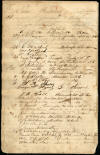 |
| Vol. I - Page 8 |
General
J. G. Bynum, Rutherfordton
John
Gray Bynum represented Rutherford County in the House of Commons in
1840, 1850 and
1852 and in the State Senate in 1856 and 1860.
Apparently, his title, "General," was due to the fact
that at one time he served as Adjutant General of North Carolina.
J. F. E. Hardy -"Swannanoa Hill"
W.
M. Hardy -"Swannanoa Hill"
Dr.
J. F. E. Hardy was a much beloved physician of Asheville from about 1840
to 1882. He was a staunch Presbyterian, being one of the pillars of
the First Presbyterian Church.
He
was a friend of Arnold Guyot who in his famous report on the altitudes of
Western North Carolina Mountains named a dominant peak in the Pisgah Area
after him. Later the mountain was named "Black Mountain" but
recently the Board of Geographic names restored the original name.
Dr.
Hardy's son, William Henry was the first soldier from Buncombe County
to be killed
in the Civil War. He was just
19 years old at the time of his death at the first Battle of Manassas.
Just before this battle he wrote his Mother a hurriedly scribbled note
reading as follows:
"Dear
Mother:
We
are about to go into an engagement.
I want you to know that if
I should be killed, all is well.
Willie"
W.
M. Hardy
His sorrowing
mother presented a silver communion service to the First Presbyterian
Church in his memory.
W.
M. Hardy served in the C. S. A. as First Lieutenant of "Buncombe
Rifleman."
"Swannanoa
Hill" was the name of Dr. Hardy's residence on Biltmore Avenue.
Bishop
Ives, Raleigh
Bishop L. S. Ives established the Episcopal Mission at
Valle Crucis. He became a
controversial figure. He was
charged with introducing schismatic practices and doctrines at the Mission
at first. He denied the charges but later resigned and left for Europe
announcing his intention to make his “submission to the Church of
Rome.” Both he and his wife
became Catholics. Returning
to the United States from Rome, Ives was dependent upon Catholic bishops
for his livelihood until he found employment in a Catholic college as a
teacher. Realizing the
sacrifices he had made, Rome commended him to the care of the American
bishops. |
 |
| Vol. I - Page 9 |
|
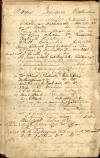 |
| Vol. I - Page 10 |
|
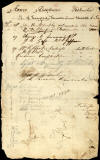 |
| Vol. I - Page 11 |
Charles
Ed Bechtler, Rutherfordton, N. C.
Charles Ed Bechtler was perhaps a son of one of the famous
silversmiths and gunsmiths who migrated to the United States from Baden,
Germany. For years the Bechtlers operated a private mint in Rutherford
County, minting coins which
were almost universally accepted as good and lawful currency.
If anything, the coins
had a larger gold content than government-minted coins.
They had a rather thriving
business because prior to the discovery of gold in California, North
Carolina was
the largest gold-producing state in the Union. Bechtler coins are quite
rare now and are much sought after by collectors. |
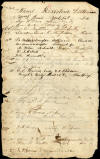 |
| Vol. I - Page 12 |
|
 |
| Vol. I - Page 13 |
W.M.
Shipp, Rutherfordton
He
was a prominent attorney of Rutherford County.
He represented that county
in the North Carolina House of Commons in 1854 and in the Senate in 1862.
He was Superior Court Judge from 1863 to 1868 and from 1881 to
1890. He was Attorney-General
of North Carolina from 1871 to 1873.
Joseph
M. D. Carson, Rutherford
Joseph M. D. Carson of Rutherford County served in the North
Carolina Senate in 1832,1836 and 1838 and in the House in 1835. His
name appears several times in this register.
He could have been the Joseph Carson who once owned Buck Forest. |
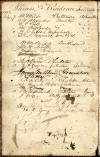 |
| Vol. I - Page 14 |
Robert
I. Johnston -Waynesville
Johnston
lived in Haywood County at that time and he later moved to Buncombe
County where he became a substantial property-owner. He was, Ramsey believes, the father of the late Mrs. Mark
Brown of Asheville and of Colonel Robert Johnston who designed the West
Asheville bridge – the only bridge on the French Broad River which
survived the 1916 flood. |
 |
| Vol. I -
Page
15 |
|
 |
| Vol. I -
Page
16 |
|
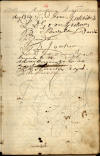 |
| Vol. I -
Page
17 |
|
 |
| Vol. I -
Page
18 |
|
 |
| Vol. I -
Page
19 |
|
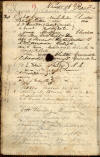 |
| Vol. I -
Page
20 |
|
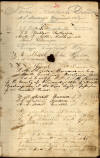 |
| Vol. I -
Page
21 |
|
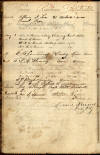 |
| Vol. I -
Page
22 |
Rev.
R. H. Chapman, Asheville
Rev. Dr. Chapman was pastor of the First Presbyterian Church,
Asheville, from 1855-1862. He had previously been slated supply minister.
A. T. Sumney
Mr. Sumney was for 16 years Treasurer of Buncombe County and for
20 years was United States Commissioner. From 1876 to 1881 he was Mayor of
Asheville. From all accounts
he was a much beloved and universally respected citizen. Few citizens held
more public offices. He was a very devout Presbyterian.
In the party with Dr. Chapman and Mr. Sumney were
Rev. William
Morrison and Rev. S. C. Alexander. Presumably, they were Presbyterian
ministers. This supports the surmise that the four guests were traveling
on some church mission.
It will be noted that one person registered all of the guests.
Ramsey has
a specimen of Sumney's signature and his view is that Sumney signed the
register for all. |
 |
| Vol. I -
Page
23 |
|
 |
| Vol. I -
Page
24 |
Cadet
Charles C. Lee, U. S. M. A. -New York
Cadet Charles C. Lee graduated at West Point in the class of 1856.
He entered the Confederate Army at the outbreak of the Civil War and was
killed June
30, 1862 while he was leading his regiment at Glendale, Virginia.
His superior officer in reporting his death referred to him as a
"brave, experienced officer and a pure man."
[Note:
Annotation at bottom of Ramsey's notes… “He served at the {?} of the
war as lieutenant colonel of the first North Carolina Regiment”] |
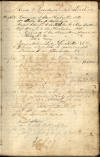 |
| Vol. I -
Page
25 |
|
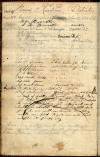 |
| Vol. I -
Page
26 |
|
 |
| Vol. I -
Page
27 |
|
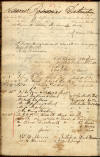 |
| Vol. I -
Page
28 |
|
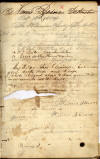 |
| Vol. I -
Page
29 |
|
 |
| Vol. I -
Page
30 |
|
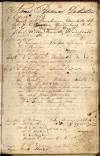 |
| Vol. I -
Page
31 |
|
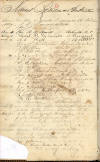 |
| Vol. I -
Page
32 |
|
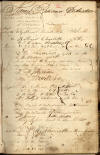 |
| Vol. I -
Page
33 |
Robert
P. Dick, Greensboro
Robert P. Dick was an eminent lawyer of Greensboro.
He served as Federal District Attorney from 1853-1861.
He was a delegate
to the Democratic Convention in Baltimore in 1860 and was the only North
Carolina delegate who did not withdraw after Douglas' nomination. He was a member of the 1861 secession convention.
After the War, he was most active in organizing the Radical or Republican
party in North Carolina. He
served for four years as Associate Justice of the North Carolina Supreme
Court.
He conducted in Greensboro a private law school, teaching many students
who later achieved distinction at the bar.
Dick was a staunch supporter of Stephen A. Douglas.
This fact perhaps accounted
for the fact that he became a Republican after the War.
Curiously enough one of Douglas' sons moved to Greensboro after the War.
Ramsey believes that this son married Dick's daughter.
The Douglases in North Carolina were staunch Republicans. |
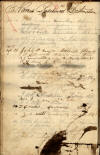 |
| Vol. I -
Page
34 |
|
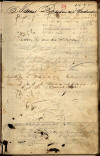 |
| Vol. I -
Page
35 |
James
W. Patton
At
the time when he stopped at Sherrill's Inn, James W. Patton owned the
Warm Springs Hotel at Warm Springs (now Hot Springs). He was a very successful business man with varied interests.
He operated the Eagle Hotel in Asheville.
He also owned a large tanyard.
For many years he was Chairman of the County Court of Buncombe
County. He was the great
grandfather of Frank M. Parker.
G.
W. Logan
This
was probably George W. Logan who served as a member of the Confederate
Congress and as a Judge of the N. C. Superior Court 1868-74.
[Note:
Annotation below Ramsey's biography… “He became a very controversial
figure in Reconstruction days.”] |
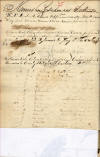 |
| Vol. I -
Page
36 |
|
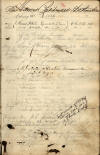 |
| Vol. I -
Page
37 |
Thomas
S. Ashe, Wadesboro, N. C.
Thomas
Samuel Ashe was a prominent politician and attorney. He
served in both houses of the North Carol1na Legislature prior to the War.
During the War he served one term in the Confederate House of
Representatives and one term in the Senate. He
was the Conservative or Democratic candidate for Governor in 1868 but was
defeated by W. W. Holden who was impeached. He served in the 43rd and 44th
Congress but declined to run for reelection.
He served as Associate Justice of the N. C. Supreme Court from 1879
to 1887. According to one account, he was a "strikingly handsome
man."
|
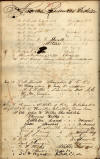 |
| Vol. I -
Page
38 |
|
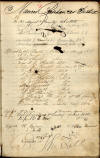 |
| Vol. I -
Page
39 |
|
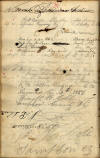 |
| Vol. I -
Page
40 |
|
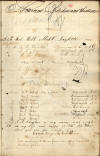 |
| Vol. I -
Page
41 |
|
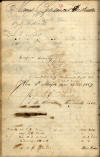 |
| Vol. I -
Page
42 |
|
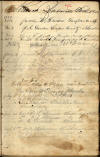 |
| Vol. I -
Page
43 |
Captain
R. P. Campbell, U. S. A.
Captain
R. P. Campbell graduated from West Point in 1840.
At the time of his
visit, he was Captain of the Second Dragoons. He resigned from the U. S.
Army in May, 1861 becoming Colonel of the 7th North Carolina Infantry.
He was killed in action at the Battle of Gaines Mill, June, 1862.
Mrs.
[Bishop] Atkinson, Wilmington
Bishop
Atkinson succeeded Ives as Bishop of the Episcopal Church and tradition
has it that he was much beloved. He
was particularly and beneficially interested in bringing about complete
reconciliation between Episcopal churches in the North and the South after
the conclusion of the Civil War. While the Episcopal Church did not divide
into separate branches, there was considerable suspicion. Bishop
Atkinson's efforts were credited with allaying the suspicion and in
bringing about concord and cooperation.
|
 |
| Vol. I -
Page
44 |
John
W. Carlisle, Spartanburg, S. C.
He
was the grandfather of Charles Wofford of Asheville. |
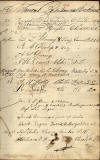 |
| Vol. I -
Page
45 |
|
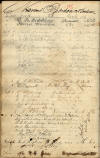 |
| Vol. I -
Page
46 |
|
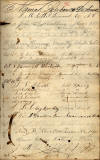 |
| Vol. I -
Page
47 |
|
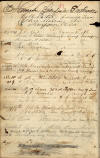 |
| Vol. I -
Page
48 |
Augustus
S. Merrimon
He
was one of the most distinguished of the political leaders born in Western
North Carolina. He
served as member of the North Carolina House of Commons in 1860 and 1861.
He was solicitor of the eighth judicial district 1861-65 and
Superior Court Judge in 1866 and 1867. In
1867 he removed to Raleigh where he resided until the time of his death.
During Reconstruction days he was an unsuccessful candidate for
many state offices.
Elected as a Democrat to the United States Senate, he served in
that position from 1873 to 1879. He was Associate Justice of the State Supreme Court from 1883
to 1889 and Chief Justice from 1889 until his death in 1892.
Henry
E. Colton
Henry E. Colton was the author of Mountain Scenery published in 1859 and
which was one of the earliest and the best of the books dealing with
Western North Carolina. He
was a newspaperman. He served
at one time as Clerk of the House of Commons. In the papers of Jonathan
Worth appear two letters to Colton who apparently was Worth’s personal
friend and political supporter. In
one letter Worth was subscribing to his paper.
In the other letter Worth was thanking Colton for some brandy and
offering to trade some lead pipe for Scuppernong brandy. |
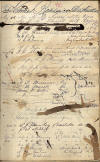 |
| Vol. I -
Page
49 |
|
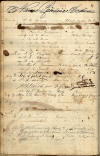 |
| Vol. I -
Page
50 |
Millard
Fillmore
Comparison
of' the signature on the register with the verified signature.
[Not] Millard Fillmore satisfies me that the former President signed the
register of Sherrill's Inn.
Thus far, I have not been able to establish from other sources the fact
that the statesman did visit Asheville in 1858.
I have had rather extensive correspondence with Dr. R.J. Rayback who wrote
the latest and the best biography on Fillmore. He has found [?] more {t s
pa~rs no references to such a visit. If Fillmore did visit Asheville, he
would undoubtedly have contacted Zebulon Vance who was a Whig
and [?] [?] who supported the Fillmore ticket in 1856. Vance was a
Member of Congress at that time.
Correspondence with Dr.
Frontis Johnson, who is editing the papers of Vance I have had ...{?] ...State Department of
Archives and History and who is also writing what should prove to be the
best life of the North Carolina statesman.
Dr. Johnson has found in Vance's papers no reference to Fillmore's visit.
Only recently, however, I managed to uncover, through another researcher,
a newspaper clipping [reference] to a contemplated visit to Asheville by
Fillmore. I hope the information which this clipping provides will
lead to more details. It may be four or five weeks before this study can
be completed. |
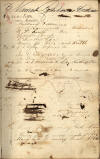 |
| Vol. I -
Page
51 |
|
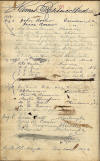 |
| Vol. I -
Page
52 |
Reverand E. .....? was Professor of Philosophy at Davidson
College and a Presbyterian Minister |
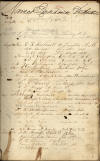 |
| Vol. I -
Page
53 |
|
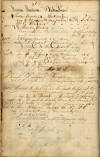 |
| Vol. I -
Page
54 |
|
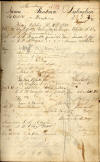 |
| Vol. I -
Page
55 |
|
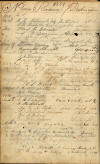 |
| Vol. I -
Page
56 |
|
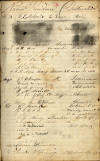 |
| Vol. I -
Page
57 |
Z I. Vance
Zebulon I. Vance served as a member of the House of Representatives, Colonel
C. S. A., three times Governor of North Carolina and as United States
Senator. He was the greatest statesman born in Buncombe County or in Western
North Carolina. He was perhaps the most popular figure who ever held high
office in North Carolina. He was a very powerful orator and inimitable
story-teller .
Statues of him stand in Capitol Square, Raleigh and in Statuary Hall in
Washington.M. Erwin
Marcus Erwin was a very able Ashevi1le lawyer. He fought in both the Mexican
War and the Civil War . He was a member of the N. C. House of Commons in
1850 and 1856 and a member of the North Carolina Senate in 1860. At one
time, he was Editor of the Asheville News. He was a brilliant speaker
and writer. He was the father of the late Marcus Erwin of Asheville who
served many terms as Clerk of the Superior Court and was Federal District
Attorney.
Although Major Erwin had been an ardent, even fire eating Secessionist, he
fraternized with the Republican party. [indecipherable]
|
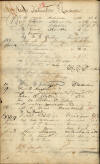 |
| Vol. I -
Page
58 |
|
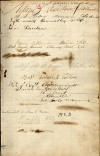 |
| Vol. I -
Page
59 |
|
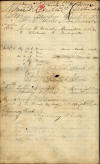 |
| Vol. I -
Page
60 |
G. M. Roberts
Was perhaps Goodson M. Roberts who served as Confederate
Postmaster of Asheville. At that time Arden was known as Shufordville.
|
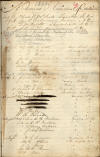 |
| Vol. I -
Page
61 |
|
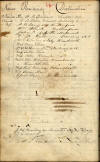 |
| Vol. I -
Page
62 |
|
 |
| Vol. I -
Page
63 |
Professor Kerr, Davidson College, N.C.
Washington Caruthers Kerr was Professor of Chemistry and Geology at Davidson
College, [1863-66.??] During Civil War he served as chemist and
superintendent of Mecklenburg Salt Works, Mt. Pleasant, S. C.. He was State
Geologist of North Carolina, 1866-82.
He was most successful in developing geological information about the state
and traveled extensively in [the] western areas of the state .
In 1882 the State of North Carolina published his map of the state -the best
up to that time .He died in Asheville in 1885 where he came in search of
health. |
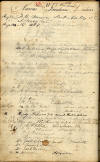 |
| Vol. I -
Page
64 |
|
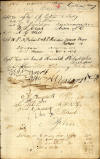 |
| Vol. I -
Page
65 |
S. Carmichael, Hawkins County, Tennessee
This could have been W. S. Carmichael who for many years operated a drug
store on Pack Square. I understand that he moved to Asheville from
Tennessee. His wife was a Miss Chapman, the sister of Frank Chapman and the
aunt of Mrs. George B. Morse. Mrs Eugene R. Cocks, Asheville, is his
daughter.Governor Johnson, Tennessee-
Obviously, this was Andrew Johnson who served as Governor of
Tennessee, [and] President of the United States and as Senator.
Born in Raleigh, N. C. , he migrated to Greenville, Tennessee, where he
lived and was buried. The probabilities are that he was en route to Raleigh
on a political mission. A comparison on the signature on the register
with the original signature of Johnson indicates that he personally signed
the register. |
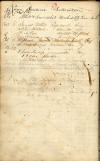 |
| Vol. I -
Page
66 |
|
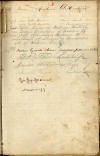 |
| Vol. I -
Page
67 |
|
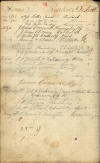 |
| Vol. I -
Page
68 |
George Davis, Wilmington, N. C
George E. Davis was a prominent Wilmington attorney.
He served as Attorney-Genera1 in the cabinet of President Jefferson Davis
(1864-65) and was a close friend of the Confederate President.
In 1878 Governor Zebu1on B. Vance tendered Davis the Chief Justiceship of
the North Carolina Supreme Court but the Wilmington attorney declined the
appointment. |
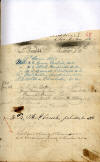 |
| Vol. I -
Page
69 |
|
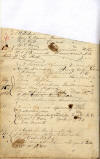 |
| Vol. I -
Page
70 |
|
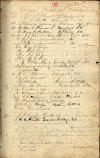 |
| Vol. I -
Page
71 |
James W. Osborne, Charlotte, N.C.
James W. Osborne was an outstanding Charlotte lawyer. He served at [??]
and at one time as Superintendent of the Federal {?] at Charlotte
and later as Judge of the North Carolina Superior Court.
Note: Ramsey suggests that he was a kinsman of Colonel Thomas D. Osborne
of Asheville.
|
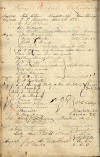 |
| Vol. I -
Page
72 |
|
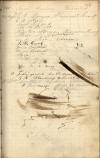 |
| Vol. I -
Page
73 |
|
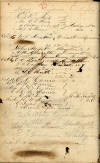 |
| Vol. I -
Page
74 |
|
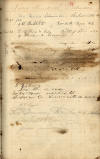 |
| Vol. I -
Page
75 |
|
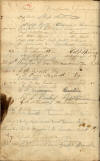 |
| Vol. I -
Page
76 |
|
 |
| Vol. I -
Page
77 |
|
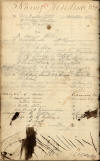 |
| Vol. I -
Page
78 |
|
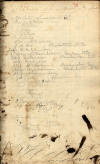 |
| Vol. I -
Page
79 |
Lieutenant I. Randolph Mordecai, Charleston, S. C.
Miss Ellen Mordecai, Charleston, S. C., Miss Minnis [?] Mordecai,
Charleston, S.C. These were doubtless the children of Moses Cohen
Mordecai, a distinguished merchant, shipping magnate and philanthropist of
Charleston. He was a much beloved Jew who was extremely loyal to the South.
He removed to Baltimore after the close of the Civil War where he achieved
much success in business but his love for, and interest in, Charleston
continued. His benefactions to the South Carolina city were many and
munificent. His biography appears in the Dictionary of American Biography,
proof of his distinction. Apparently, Moses Cohen Mordecai was not
related to the North Carolina Mordecai family which was also a distinguished
Jewish family. The original North Carolina Mordecais operated a famous
school in Lauren County. One member of this family achieved
considerable military distinction prior to the Civil War.Another was a very
successful Raleigh banker. Some of the descendents married into gentile
families.
|
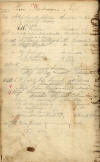 |
| Vol. I -
Page
80 |
P. D. Gold, Goldsboro, N. C.
Gold appears previously in this register as a resident of Shelby.
Pleasant Daniel Gold was born in Cleveland County , studied law and
practiced for two years. He entered the ministry of the Missionary Baptist
Church and served as a Chaplain in the Confederate Army .
Later he affiliated with the Primitive or Old School Baptist Denomination.
In 1867 he established the "Zion's Landmark" at Wilson. That
publication continues as the organ of the Primitive Baptist Church. Elder
Gold was one of the outstanding National leaders of that denomination. His
son, John D. Gold, established the Wilson Daily Times which is now
owned and operated by his daughter,
Mrs. Elizabeth Swindell. Two of Elder Gold's sons, P. D., II and Charles W.
Gold, founded the Jefferson Standard Life Insurance Company. [See Julian
Price] Swindell, the granddaughter of P. D. Gold, believes that her
grandparents were on their honeymoon at the time when they registered at
Sherrill's Inn.
|
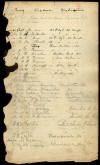 |
| Vol. I -
Page
81 |
|
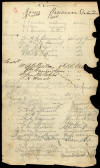 |
| Vol. I -
Page
82 |
|
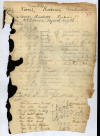 |
| Vol. I -
Page
83 |
|
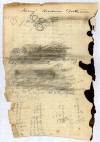 |
| Vol. I -
Page
84 |
|
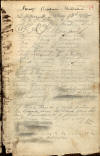 |
| Vol. I -
Page
85 |
|
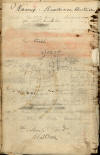 |
| Vol. I -
Page
86 |
|
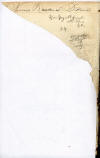 |